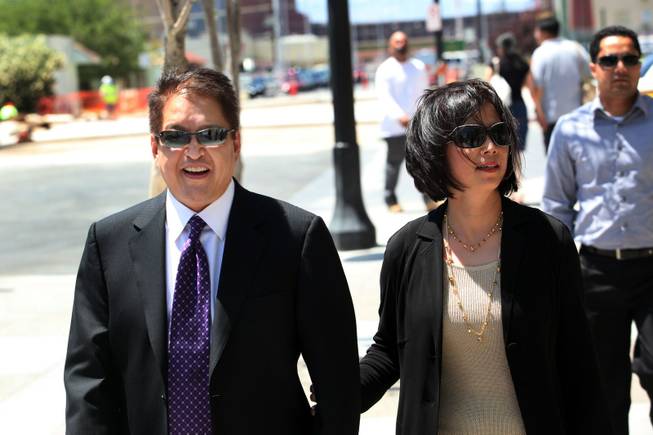
Terrance K. Watanabe, left, of Omaha, Neb., leaves the Regional Justice Center following his arraignment in Las Vegas on May 20, 2009, accompanied by sister Pam Watanabe-Gerdes.
Published Friday, Jan. 29, 2010 | 1:06 p.m.
Updated Friday, Jan. 29, 2010 | 8:50 p.m.
Sun Archives
- New attorney takes on booze defense (10-21-2009)
- Harrah's hires local gun to help in Watanabe case (9-13-2009)
- New attorneys assist in Harrah's probe of high roller's intoxication claims (7-25-2009)
- High-roller fights law regarding collection of gambling debts (7-17-2009)
- Grand jury indicts high roller in $14.7M casino debt case (4-29-2009)
- High roller posts $1.5 million bail to avoid jail stay (2-18-2009)
A Clark County District Court ruled today that Harrah’s Entertainment must turn over records to attorneys representing a high roller who allegedly owes $14.7 million in gambling debts.
Businessman Terrance Watanabe, one of the biggest gamblers in Las Vegas history, alleges casino giant Harrah’s Entertainment not only kept him drunk but fed him drugs to induce his massive gambling losses.
Watanabe lost $127 million in Harrah’s-owned Caesars Palace and Rio casinos in 2006 and 2007 and has paid about $112 million of that to the company. A grand jury indicted Watanabe on felony theft charges in April for passing bad checks stemming from the remaining amount Harrah’s says it is owed.
Watanabe, facing 28 years in prison if convicted, claims he doesn’t owe the money because the markers he signed aren’t enforceable.
Watanabe also claims Harrah’s had agreed to forgive the amount of gambling losses he owed by 30 percent and had racked up gambling rewards points entitling him to further discounts. He also says Harrah’s agreed to withhold collection of his markers for at least 60 days.
District Court Judge Jennifer Togliatti ruled that Watanabe could collect otherwise confidential information from Harrah’s Entertainment to build his defense in a criminal case prosecuted by the district attorney’s office. The information also could be used in a separate civil case Watanabe has filed against Harrah’s.
“This is a huge boost to the defense,” Watanabe’s Los Angeles-based attorney, Pierce O’Donnell, said after the hearing.
Las Vegas attorney Dominic Gentile, representing Harrah’s, said he was also happy with the hearing because the ruling set specific parameters on the information Watanabe could seek from the company.
“What the judge said today is that a criminal defendant such as Mr. Watanabe doesn’t get to go on a fishing expedition,” Gentile said.
Separately, Nevada casino regulators are investigating Watanabe’s gambling history. State law forbids casinos from allowing intoxicated customers to make bets while continuing to ply them with alcohol.
While free — and free-flowing — booze is a key and legal part of casinos’ marketing strategy to lure players, Watanabe’s attorneys claim he was excessively drunk to the point that he was slumped over at the gambling tables and walking into walls.
Harrah’s Entertainment must turn over records of alcoholic beverages served to Watanabe, casino credit extended to Watanabe, computer records tracking his gambling activity and records of notes about Watanabe that employees handed off to the next shift of workers. If specific records of Watanabe’s alcohol consumption aren’t available, Harrah’s must produce records indicating shipments of Jewel of Russia — an unusual brand of vodka Watanabe’s attorneys say he drank in large quantities during his gambling binges.
Harrah’s also must hand over surveillance video of him gambling at Caesars Palace and any information related to prescription and non-prescription drugs provided to Watanabe by Harrah’s employees.
In addition, Harrah’s must turn over Gaming Control Board documents related to Watanabe’s conduct and any written correspondence between Harrah’s Entertainment and Wynn Las Vegas, where Watanabe was previously gambling before he was courted to play at Caesars and Rio.
Chief Deputy District Attorney Bernie Zadrowski, who is prosecuting Watanabe, argued in court that the vast majority of information sought by Watanabe is irrelevant to the case.
Under the state’s bad check law, casino markers are considered checks. Individuals must have the money to pay them the instant they are signed, regardless of any side agreement with a casino or the state of mind of the person signing the check, he said.
“The crime is drawing on a lack of funds, not failing to pay the money back,” Zadrowski said. A casino may agree not to cash a marker right away as a courtesy, but “it doesn’t mean you can’t have money in your account,” he said.
District Court Judge Donald Mosley still must decide whether the information will be admissible during the trial, which is scheduled to begin July 12.

Join the Discussion:
Check this out for a full explanation of our conversion to the LiveFyre commenting system and instructions on how to sign up for an account.
Full comments policy